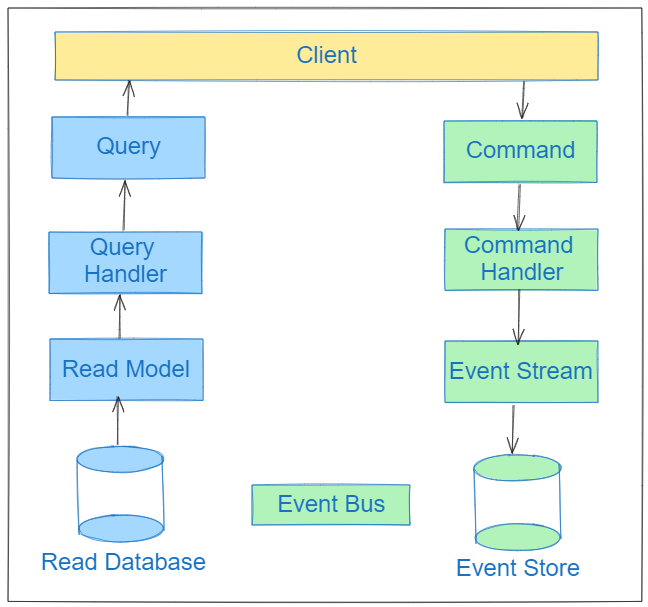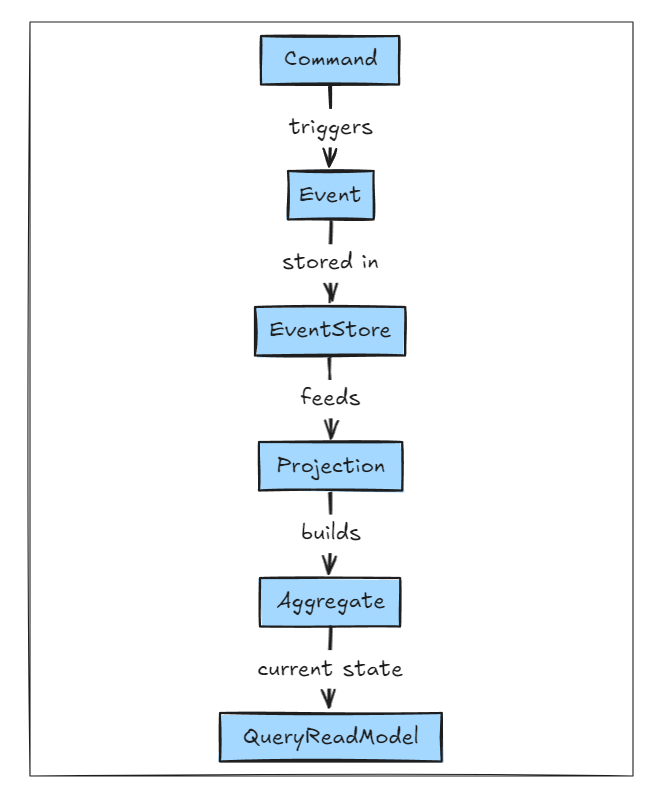Event Sourcing Explained Benefits, Challenges, and Use Cases
Event Sourcing Explained: Benefits, Challenges, and Use Cases
From Events to State: A Guide to Event Sourcing in Software Development
Event sourcing is a pattern in software architecture where the state of a system is determined by a sequence of events. Instead of storing just the current state of the data, event sourcing involves storing all the events that lead to the current state. This approach allows for the recreation of the system’s state at any point in time by replaying the events.
Key Concepts in Event Sourcing
Event: An event is a record of a change in the system. Each event represents a significant change that has occurred, typically containing information about what happened, when it happened, and any relevant data. Events are immutable, meaning once an event is created, it cannot be changed.
Event Store: This is a storage system where all events are saved. The event store is append-only, meaning new events are only added to the end of the sequence. This ensures that the history of events remains intact and unaltered.
Event Stream: Events are often categorized into streams, which represent sequences of events related to a particular entity or aggregate (e.g., a specific user or order). Each event stream can be thought of as a timeline of changes for that entity.
Event Handlers: These are components that respond to events. Event handlers can update projections or materialized views, which are used to build the current state of the system in a format that’s efficient for querying.
Projection: A projection is a view of the system’s state that is derived from the event stream. Projections can be used to create read-optimized views of the data, aggregating information in ways that are efficient for querying.
Benefits of Event Sourcing
Auditability: Since all changes are recorded as events, it’s possible to trace back the history of changes, providing a complete audit trail.
Temporal Queries: You can recreate the state of the system at any point in time by replaying the events up to that moment.
Flexibility: Different projections can be created to serve different needs without altering the underlying events.
Scalability: Event sourcing can improve scalability, especially in distributed systems, by decoupling the write and read models.
Reliability: Events are typically stored in a durable and reliable manner, ensuring that no data is lost even in the case of system failures.
Challenges of Event Sourcing
Complexity: Implementing event sourcing can add complexity to the system, requiring careful design and handling of events.
Storage: Storing every event can lead to large amounts of data, which requires efficient storage and retrieval mechanisms.
Consistency: Ensuring eventual consistency across projections can be challenging, especially in distributed systems.
Reprocessing: Replaying events to rebuild state can be time-consuming for large event streams.
Use Cases
Event sourcing is particularly beneficial in scenarios where capturing the complete history of state changes is crucial, ensuring auditability, scalability, and flexibility. Here are some of the best cases for using event sourcing:
1. Financial Systems
Financial applications, such as banking and trading systems, often require a detailed audit trail of all transactions for regulatory compliance and fraud detection. Event sourcing provides an immutable log of every transaction, making it easy to track changes and recreate the state at any point in time.
2. E-commerce Platforms
E-commerce systems benefit from event sourcing for tracking the lifecycle of orders, payments, inventory changes, and user activities. This allows for accurate audit trails and the ability to handle complex business workflows, such as returns and refunds.
3. Audit Logging and Compliance
Industries that require strict audit logging and compliance, such as healthcare, finance, and government, can leverage event sourcing to maintain a detailed and immutable log of all operations and changes, ensuring transparency and accountability.
4. Collaborative and Multi-User Systems
Applications that involve collaboration among multiple users, such as project management tools, collaborative document editing, and social networks, can use event sourcing to track changes made by different users over time. This helps in conflict resolution and maintaining a clear history of changes.
5. Real-Time Data Processing and Analytics
Event sourcing is ideal for systems that need to process and analyze real-time data streams, such as monitoring systems, IoT platforms, and recommendation engines. Events can be consumed and processed in real-time to generate insights and trigger actions.
6. Complex Business Processes
Systems with complex business processes and workflows, such as supply chain management, logistics, and order fulfillment, benefit from event sourcing by maintaining a clear history of all steps and actions taken, facilitating debugging and process optimization.
7. Microservices Architectures
In microservices architectures, event sourcing can be used to achieve eventual consistency across services. By using events to communicate state changes between services, the system can remain loosely coupled while maintaining a reliable and consistent state.
8. Domain-Driven Design (DDD)
Event sourcing aligns well with Domain-Driven Design (DDD) principles, especially in complex domains where understanding the sequence of state changes is important. It allows modeling of domain events that capture significant occurrences within the business context.
9. Undo and Replay Functionality
Applications that require undo and redo functionality, such as design tools, IDEs, and game development, can use event sourcing to keep track of all user actions, allowing users to revert to previous states or replay actions.
10. Customer Relationship Management (CRM) Systems
CRMs can benefit from event sourcing by keeping track of all interactions with customers, such as emails, calls, and meetings. This detailed history helps in understanding customer behavior and improving customer service.
11. Telemetry and Logging Systems
Systems that need to log telemetry data and events, such as application performance monitoring and security logging, can use event sourcing to maintain an accurate and immutable record of all events, enabling thorough analysis and troubleshooting.
Full Example of Event Sourcing in Java
Let’s create a detailed example in Java to illustrate event sourcing. We’ll build a simple banking application where users can create accounts, deposit money, and withdraw money. The example will show how events are generated, stored, and used to reconstruct the state of an account.
1. Define the Events
First, we’ll define the types of events that our system will handle:
1
2
3
4
5
6
7
8
9
10
11
12
13
14
15
16
17
18
19
20
21
22
23
24
25
26
27
28
29
30
31
32
33
34
35
36
37
38
39
40
41
42
43
44
45
46
47
48
49
50
51
52
53
54
55
56
57
58
import java.time.LocalDateTime;
abstract class Event {
private final String accountId;
private final LocalDateTime timestamp;
public Event(String accountId) {
this.accountId = accountId;
this.timestamp = LocalDateTime.now();
}
public String getAccountId() {
return accountId;
}
public LocalDateTime getTimestamp() {
return timestamp;
}
}
class AccountCreated extends Event {
private final String owner;
public AccountCreated(String accountId, String owner) {
super(accountId);
this.owner = owner;
}
public String getOwner() {
return owner;
}
}
class MoneyDeposited extends Event {
private final double amount;
public MoneyDeposited(String accountId, double amount) {
super(accountId);
this.amount = amount;
}
public double getAmount() {
return amount;
}
}
class MoneyWithdrawn extends Event {
private final double amount;
public MoneyWithdrawn(String accountId, double amount) {
super(accountId);
this.amount = amount;
}
public double getAmount() {
return amount;
}
}
2. Event Store
Next, we’ll implement a simple event store to save the events:
1
2
3
4
5
6
7
8
9
10
11
12
13
14
15
16
17
import java.util.ArrayList;
import java.util.List;
import java.util.stream.Collectors;
class EventStore {
private final List<Event> events = new ArrayList<>();
public void appendEvent(Event event) {
events.add(event);
}
public List<Event> getEvents(String accountId) {
return events.stream()
.filter(event -> event.getAccountId().equals(accountId))
.collect(Collectors.toList());
}
}
3. Account Aggregate
The account aggregate will handle the business logic and apply events to maintain the account’s state:
1
2
3
4
5
6
7
8
9
10
11
12
13
14
15
16
17
18
19
20
21
22
23
24
25
26
27
28
29
30
31
32
33
34
35
36
37
38
39
40
41
42
43
44
45
46
47
48
49
50
51
52
53
54
55
56
57
58
59
60
61
62
import java.util.List;
class Account {
private String accountId;
private String owner;
private double balance;
private final List<Event> events = new ArrayList<>();
public Account(String accountId, String owner) {
this.accountId = accountId;
this.owner = owner;
this.balance = 0.0;
}
public void apply(Event event) {
if (event instanceof AccountCreated) {
AccountCreated accountCreated = (AccountCreated) event;
this.accountId = accountCreated.getAccountId();
this.owner = accountCreated.getOwner();
} else if (event instanceof MoneyDeposited) {
MoneyDeposited moneyDeposited = (MoneyDeposited) event;
this.balance += moneyDeposited.getAmount();
} else if (event instanceof MoneyWithdrawn) {
MoneyWithdrawn moneyWithdrawn = (MoneyWithdrawn) event;
this.balance -= moneyWithdrawn.getAmount();
}
}
public void loadFromHistory(List<Event> events) {
events.forEach(this::apply);
}
public void createAccount() {
Event event = new AccountCreated(accountId, owner);
apply(event);
events.add(event);
}
public void depositMoney(double amount) {
Event event = new MoneyDeposited(accountId, amount);
apply(event);
events.add(event);
}
public void withdrawMoney(double amount) throws Exception {
if (this.balance >= amount) {
Event event = new MoneyWithdrawn(accountId, amount);
apply(event);
events.add(event);
} else {
throw new Exception("Insufficient funds");
}
}
public double getBalance() {
return balance;
}
public List<Event> getUncommittedEvents() {
return new ArrayList<>(events);
}
}
4. Using the System
Here’s how you would use the system to create an account, deposit money, and withdraw money, while keeping track of the events:
1
2
3
4
5
6
7
8
9
10
11
12
13
14
15
16
17
18
19
20
21
22
23
24
25
26
27
28
29
30
31
public class Main {
public static void main(String[] args) {
try {
// Initialize the event store
EventStore eventStore = new EventStore();
// Create a new account
Account account = new Account("12345", "Alice");
account.createAccount();
eventStore.appendEvent(account.getUncommittedEvents().get(0));
// Deposit money into the account
account.depositMoney(100.0);
eventStore.appendEvent(account.getUncommittedEvents().get(1));
// Withdraw money from the account
account.withdrawMoney(30.0);
eventStore.appendEvent(account.getUncommittedEvents().get(2));
// Simulate system restart by loading from event history
List<Event> loadedEvents = eventStore.getEvents("12345");
Account restoredAccount = new Account("12345", "");
restoredAccount.loadFromHistory(loadedEvents);
// Check the restored account balance
System.out.println("Restored Account Balance: " + restoredAccount.getBalance());
} catch (Exception e) {
e.printStackTrace();
}
}
}
Explanation
Event Definition: We define the events AccountCreated, MoneyDeposited, and **MoneyWithdrawn **to capture state changes.
Event Store: The **EventStore **class saves and retrieves events based on account ID.
Account Aggregate: The **Account **class handles applying events to maintain state and business logic. It can also generate new events for state changes.
Usage: We demonstrate creating an account, depositing money, and withdrawing money while storing each event. After simulating a system restart, we load the account’s state from the stored events to verify the correct balance.
This example shows how event sourcing allows us to reconstruct an account’s state by replaying the events, ensuring a complete and auditable history of changes.
Conclusion
Event sourcing is a powerful pattern that offers significant benefits in scenarios requiring detailed auditability, complex state management, and real-time processing. It is particularly valuable in domains where understanding the history of changes is crucial for compliance, analysis, and improving business processes. While it introduces some complexity, the advantages in terms of reliability, scalability, and flexibility often outweigh the challenges, making it a compelling choice for many modern applications.



